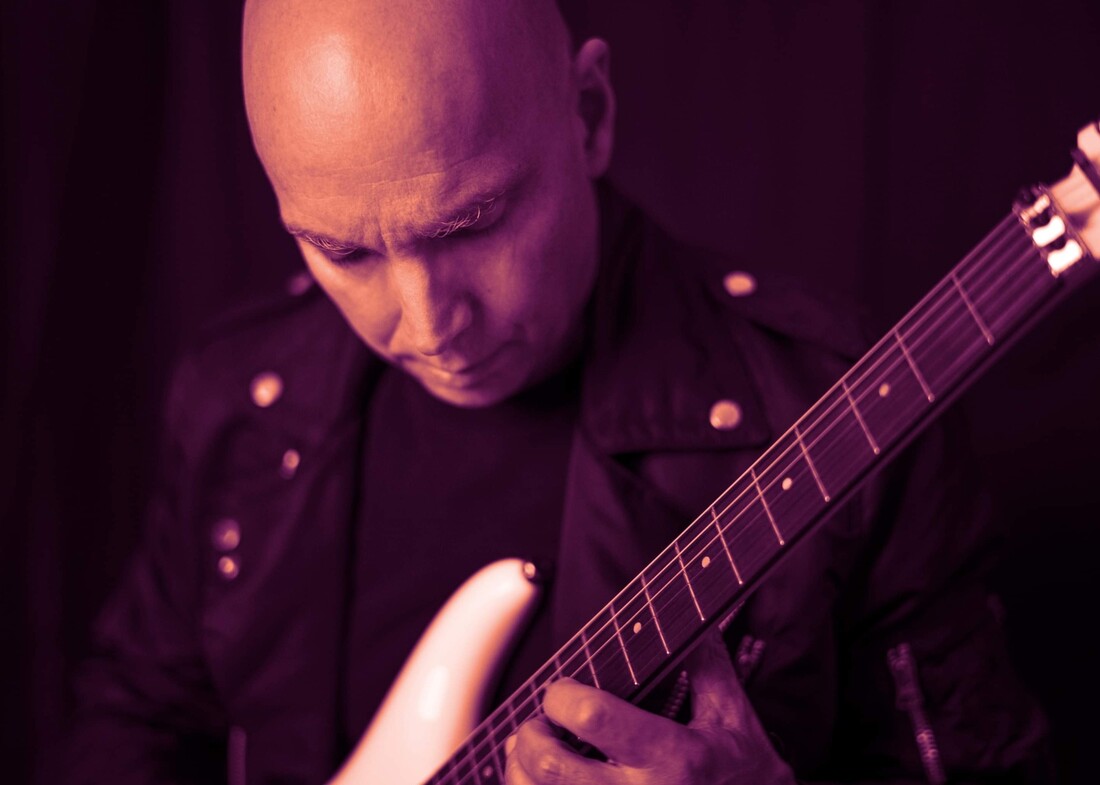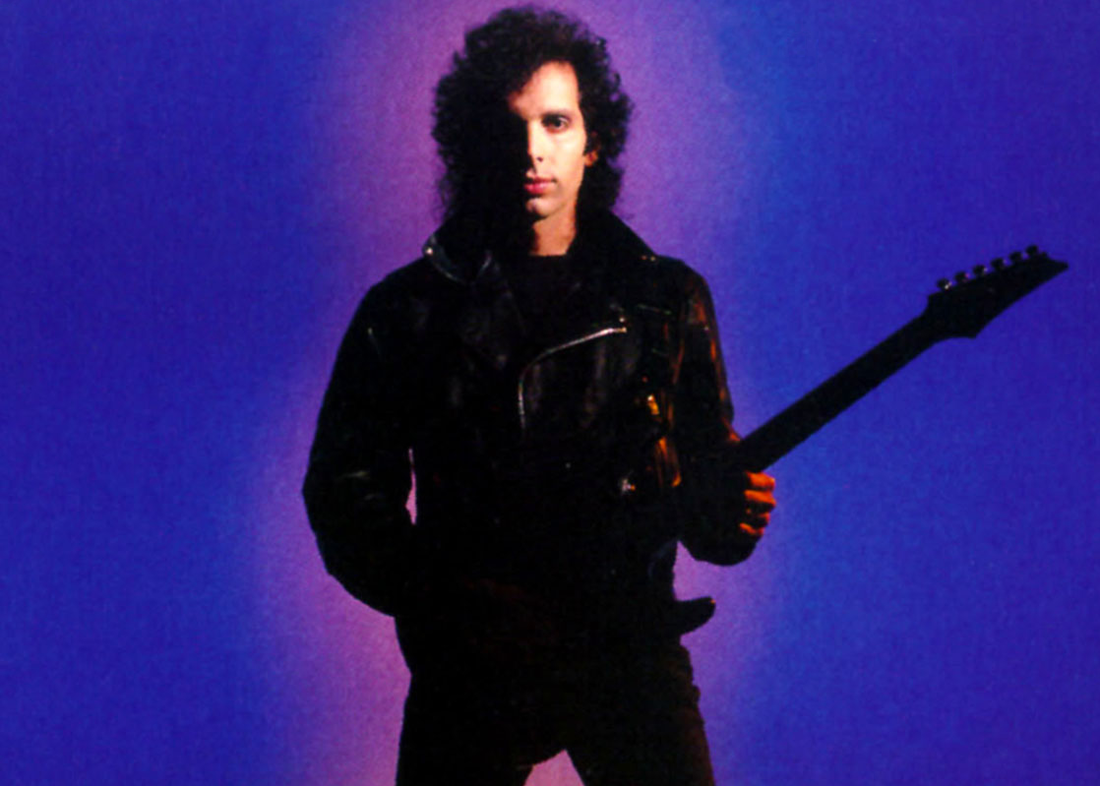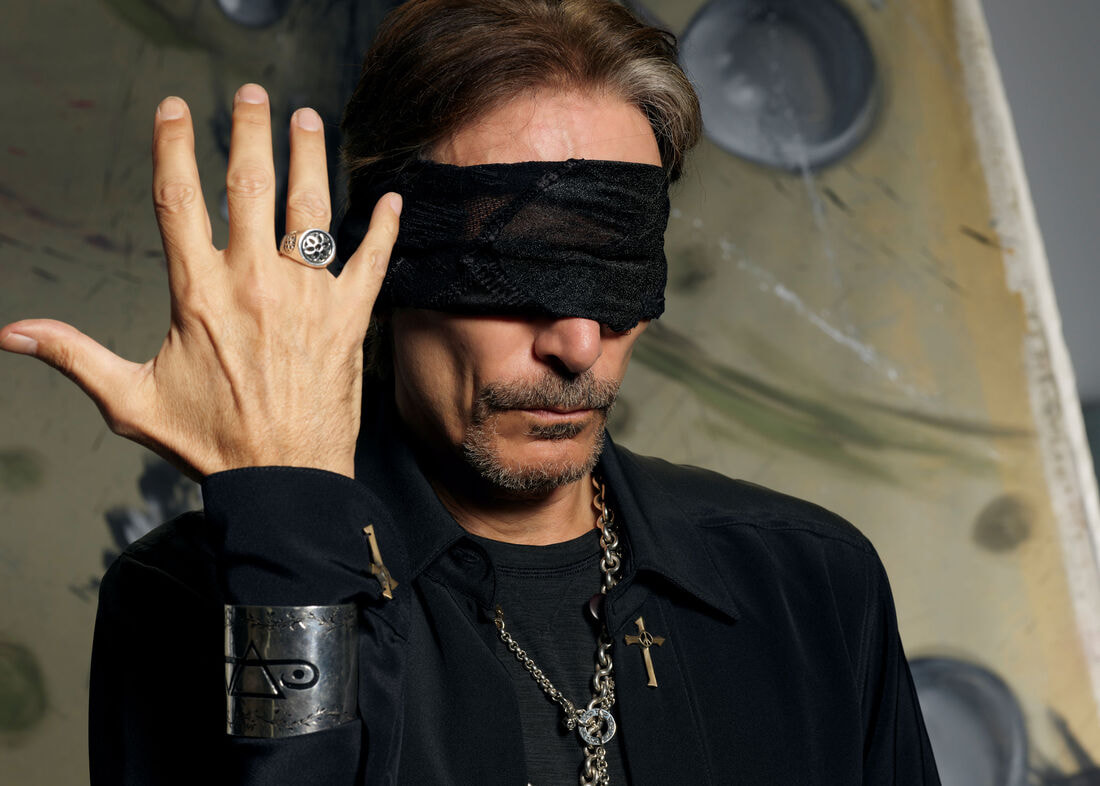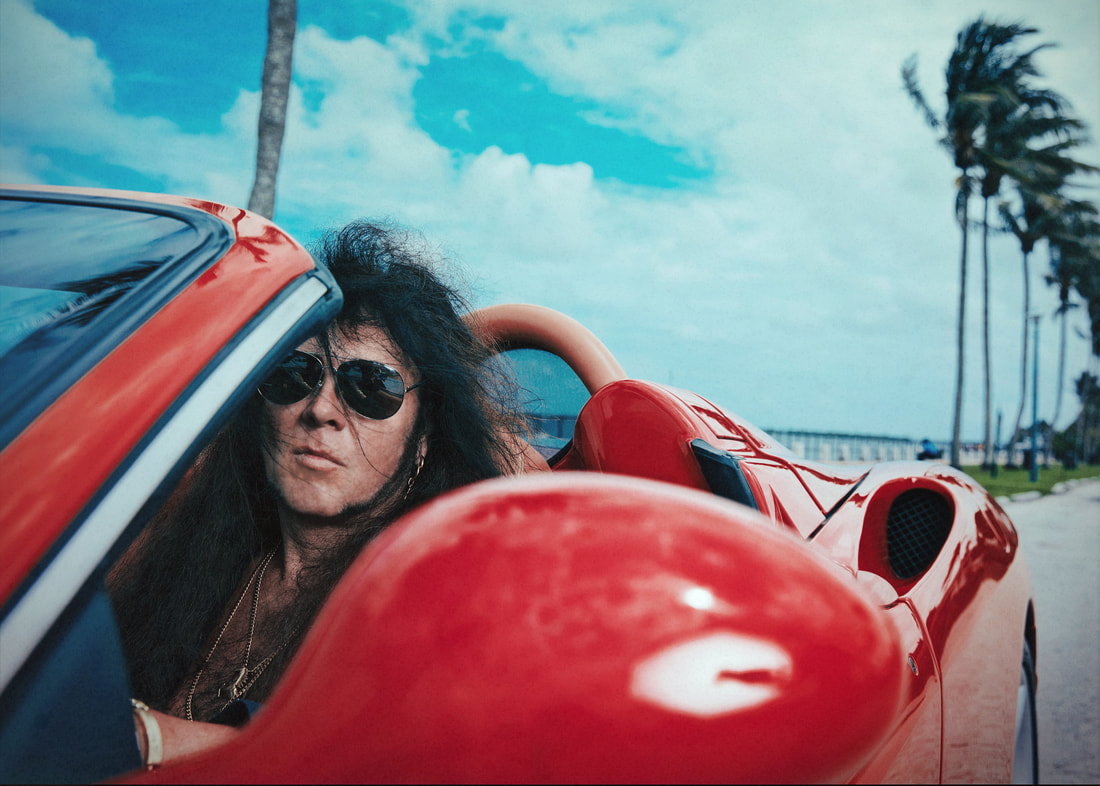|
The guitar heroes’ guitar hero, Joe Satriani needs little introduction. The maestro behind classics ‘Surfing with the Alien’, ‘Flying in a Blue Dream’ and more, he’s collaborated with former student Steve Vai, Alice Cooper, and Deep Purple to name just a few. An incredible nineteen albums into his career, he’s still pushing the boundaries of innovation, as can be heard on his latest release ‘The Elephants of Mars’. We sat down with Joe for a chat about the set, and touch on some key moments from his musical past. The extremist; Eamon O’Neill.
Hi Joe, how are you today?
I’m very good! Very good today, yeah, thank you. Everything’s good here in San Francisco. I moved here around ’76, and just really did enjoy the west coast. A big difference from growing up in New York. I just kind of fell in love with the attitude out here. I’m chatting to you from Ireland, and I was wondering if you were a fan of some of our great players like Rory Gallagher and Gary Moore? Yes. Growing up, believe it or not on Long Island, they really enjoyed a lot of popularity. We all had the records, and they were always played at parties. We always wondered like; “where did these guys come from?! What’s happening in Ireland that’s making these guys play like this?!” A very interesting take, especially when we had such a history of that sort of blues rock guitar coming from the US, but when you hear it coming back from Ireland and the UK and the rest of Europe, it was so exotic sounding, like it had some extra style, an extra something to it, you know? We’re hear to talk about new album ‘The Elephants of Mars’, and from the off, that’s a great Joe Satriani title, isn’t it? It’s funny how those things happen. They really just pop into my head and they are part of a package of inspirations that I have to kind of sort out, really fast. I had the song that had this crazy sound that you would imagine would be coming from some sort of gigantic elephant. One thing led to another and I started to imagine this story about future earth scientists terraforming Mars, creating a beautiful planet that they plan to exploit for raw materials, but, unknowingly, they produced on the planet, a species of gigantic, sentient elephants that could communicate telepathically; not only among themselves, but to the new Mars colonists, and they could play incredible music with their trunks, of course! And then they start a revolution with the colonists there to try to wrestle control of the planet away from the evil corporations of Earth that just want to take all the raw materials off for profit. That’s an incredible story. There’s just the story that I brought to the band, and it was a good inspiration for us too, to figure out how we’re going to play this thing with a sense of humour, but also, a sense of science fiction. Musically, the title track veers from this beautiful, clean Stratocaster-sounding solo, to a heavily processed, trademark Joe Satriani sound. The funny thing about this whole guitar-scape on the album is, contrary to what you see behind me, all these beautiful amps, I didn’t use any of them on the album. I used a SansAmp plugin made by Avid, maybe back in the mid ‘90s. I didn’t really plan on doing it that way, it just happened that as I worked on the album song after song, the recording of my guitar playing through that plugin kept being the one that we would pick. My engineers Eric Caudieux, and my mix-engineer would just pick that one over anything that I gave them that was through traditional means. There was obviously something special about it. That plugin gave me the most beautiful clear tones for chords, for soloing, as well as the most outrageous overly distorted tones. And they took the pedals really well, because I had a bunch of little pedals, like you mentioned, on ‘The Elephants of Mars’, that crazy, stereo guitar sound, is actually my guitar left channel just going through the SansAmp; the right channel is going through an Electro Harmonix Micro Q- Tron exclusively, with the mix 100%. That pedal is kind of funky, so it never really goes 100%, so there’s all kinds of phasing that goes back, and in between the two channels, but that’s what I thought gave it its sort of Martian charm! Those trademark tones have always been so important to your sound; didn’t you try to recreate the tone of ‘Surfing with the Alien’ [1987] for ‘Back to Shalla-Bal’ [1989]?
The queen of Zenn-La! Yeah, we tried to recreate it using the same kind of, sort of updated Eventide gear, but the funky story behind the original guitar performance on the track ‘Surfing With the Alien’ was that it as done under much duress because we were late getting out of the studio that day. There were people standing at the door with their arms crossed waiting for me to get out of the studio. It was about four in the afternoon, and we were plugged into the Eventide 949 that kept malfunctioning. We were trying to get it to stay at plus or minus eleven cents on each side, and it would only give us negative eleven cents on one side, and it kept shifting! And I recorded that melody all the way, and the last section of the song with the solo using the whammy bar, all in one take while these people are staring at me saying; “get out of the studio!” And when we get to the end of the song, the unit just dies! So you were stuck with that take for ‘Surfing with the Alien’? We couldn’t go back and just fix it. We couldn’t go back and fix the out of tune bits or anything; it was either; “we either use that, or we don’t”, and in the end we decided to just use it because it had some kind of special life to it. So when we were doing ‘Back to Shalla-Bal’, we tried to recrate it, but it was impossible because we were chasing after a sound that was created by a unit that was breaking and finally died! ‘Back to Shalla-Bal’ arguably peaks with the solo section at 1:30; is that a phaser on there? Yeah that was, I’m going to guess; boy, what were the numbers? H3000, I think was the model at the time, the Eventide harmoniser. I think that was the newest model, and so the processing just got better and it got quicker, and that’s what you wanted. So when you had your main signal in the middle, and you could dip the pitch minus four cents on one side, and plus four cents on the other, sort of like a rigid multi-track, where no matter what you do, those parameters stay put; different than let’s say a flanger or a phaser where it’s continually moving and you get swooshing and phasing; this is sort of rock solid. The only problem that we had back then was that the processor would take some time to spit out this other sound, and in those few milliseconds, you would get this kind of slap-back sound, and you either wanted that, or you didn’t. I’d imagine you had no such problems recording ‘The Elephants of Mars’. Today, let’s say, if you print that with Pro Tools, you can go in and correct the late timing of the harmoniser, and you can bring them in so that they sound perfect. Sometimes that’s good, and then sometimes that kind of spoils the charm. In this particular case, using the Micro Q- Tron, we decided just to leave it alone and let it do its funky thing, and it was kind of reminiscent of tracking ‘Surfing With the Alien’ because, as I explained, it was one pass, and for ‘The Elephants of Mars’, that long solo was just one pass. I did it once, and I didn’t know if we were going to keep it because it was so funky sounding, but once I sent it off to the guys, the really loved it, so we left it alone. One of the most beautiful tracks on the album is ‘Faceless’, which is epic in scale, yet fraught with emotion. Thank you. I think I was reacting to normal situations in life where you feel like you’re misunderstood or someone can’t see you for who you really are and you’re trying to get through to somebody. I think those feelings were brought out in me early during the pandemic when we were all reacting to being out in the world, but with our faces covered. It got me thinking about that situation but on a more personal, emotional level, when you feel ‘unseen’, and no one knows you for your unique personality – they just treat you as any other random human being – and the loneliness that it creates inside of you. So, this person playing the guitar in the song is trying to reach out, and saying; “I’m somebody unique, I’m somebody special, I want you to see me”. I suppose the solo section is as a moment of hope, where that person is felling like they’re finally able to express themselves and be seen for who they are by the rest of the world, but it’s brief, and it goes back into the minor key of despair as the person goes back to feeling like they’re faceless. How did you go about constructing the solo for ‘Faceless’? It's interesting, you know, you work on these songs for quite a long time and you try lots of different things. That solo section, originally, was extremely short, and it had the main theme performed, and Eric and I went back and forth wondering if the song could survive being longer, and did the solo section, the moment of hope need to be longer just to balance the sadness of the song. Eventually, I came up with a really long section, and realised that it couldn’t be a shreddy kind of a thing; it had to be riff-based, almost. It had to have little musical inventions, and then it had to have just a few moments of just sort of, blues, crying, kind of phrases in it. But it was all quite natural; I create the space and then I play over it without thinking, just feeling, and then I go back and I listen to it and I say; “that’s the right track”, reacting in the right way, because we had to somehow get back to the minor key, and that’s always a trick with instrumental songs, when you get out of the solo, how do you get back to the verse? It’s a very difficult thing when you don’t have lyrics! You’re one of the most celebrated guitarists in the world, but in recording solos like that, do you ever hit a bum note?!
Yes! And I have to say, one of the benefits of recording alone, you know, doing this album remotely, is that I could do that and I would get no flack from the band! Usually when you’re in a studio and you’re tracking and you’ve got your friends with you, you’re going to play a bad note and people are going to make fun of you; the rest of the day, they don’t let you forget it! That’s just the way we are, and it’s a good way for all of us to relieve the tension that exists when you’re trying to get everything right really quickly. The studio environment is very expensive; every minute costs, and in my case, being a solo artist, every hour is just a lot of money flying out the door. So, ‘The Elephants of Mars’ was recorded entirely remotely? This was very different. We all recorded remotely in our own private studios, homes, wherever we were in the world, and we were able to relax, and when you do that, when you allow yourself to make mistakes, basically, what you’re doing is you’re pushing yourself to play things you’ve never played before, you’ve never rehearsed. I think we got much better performances out of each other, knowing that we could make mistakes and push ourselves into new territory. I’m amazed that you recorded it all remotely; the song ‘Blue Foot Groovy’ sounds exactly like it was recorded live, with the band all in the room feeding off each other. You know, that’s probably one of those songs that has some of the oldest recorded parts blended with some of the most recent. I think Rai [Thistlewayte] was the last person to play on it; he put organ on it, and he could react to everyone’s performances. I think when it went, it was me doing all the guitars, and I think Kenny [Arnoff] did the drums, and then Bryan [Beller] did the bass, and then Rai did the keyboards, and this was spread out over a year and a half, maybe. So, in every moment of overdubbing, each person had the chance so sit back and say; “how do I make this sound live?” This is kind of like what I was talking about before, is that, if we were all in the studio together, we’d all be looking at the clock, and we’d be behaving; not really giving all of our best because we know that time is money, and “let’s get the right”, and you don’t want to screw up because you might make somebody else screw up. That sounds like a relatively organic process. You get a performance that’s professional but not over the top. On this record, we needed more than that, and so playing remotely, and being able to listen to what each musician was adding along the way gave everyone this extra perception, I think, of how to keep it live, and so, just what you mentioned is fantastic for me to hear, because that’s what we were all looking for; to keep it live, and give us your best performance that you think – that’s what I was saying to the guys; “give me what you think would work best here; not what I would have written on a page and handed to you in the studio”. The album has a real contemporary sound to it, mixing your classic approach with electronic elements first found in the experimental ‘Engines of Creation’ [2000]. Yes. I know that album was a bit challenging at the time that it came out because that was just me and Eric working out of his living room in Studio City, but it was so much fun. Working like that was really a wonderful moment for composing for me because it really took that pressure of time out of the equation, and if we got crazy ideas at three in the morning to completely rearrange a song, we could do it because we were working in a non-destructive editing zone, and there was no band, and no one to get mad at us for changing the arrangement at the last minute! So, these things are really important to the creative balance that you would hope to achieve on an album. And of course, Eric is back as a producer on this album. He’s also playing some keyboards, and a few other things he picks up – he’s got lots of instruments at his house. Together we arranged all these things and he contributed some composing on about three songs, I think, that really were important to getting the songs in their, what I thought, perfect state. And so, this album really is a great example of what I’ve always told people, which is collaboration is so much fun. It’s so important to open up and collaborate, as I did with Chickenfoot; the collaboration was fantastic, just letting other people’s ideas in and running with them and seeing where they take you. It always brings you to a higher point, which I think is a great thing for all musicians to embrace. I wanted to talk to you about your infamous ‘Black Dog’; the hand-painted Ibanez which appears on the back cover of ‘Flying in a Blue Dream’; do you still have it?
I do still have that guitar. The sad history of that guitar was that, it was stolen before a gig. We were doing a short tour opening up for Steve Miller, and it was stolen just a few hours before the show. About two weeks later we wound up retrieving a few guitars from that theft in a very comical police sting operation that went really funky! In the end, Stu [Hamm] got two basses back, I got three guitars back, and all the other gear was gone forever. What the thieves had done unfortunately, was they rubbed off all the artwork because they thought they could sell the guitar more easily if they got rid of the identifying marks, so by the time I got it back, it was basically just a funky-looking black guitar. That must have been heart-breaking! That was the prototype for the original JS line that we worked on in the early days of Ibanez and myself getting together. So I re-illustrated it, but it was never quite the same. Years later, a Japanese artist working for Ibanez was able to recreate, stroke for stroke, the actual artwork using those photographs [from the album artwork] as guides, and we created the reissue of the guitar [the 2008 JSBDG Prestige] and it really looks beautiful; I mean, I can’t believe I didn’t do it! It’s just so stunning looking. So yes, I do have the original guitar, and I do have the reissue which plays and looks great, so there’s quite a history there. What year was that that the guitar went missing? I think that was ’90, maybe? I think it must have been… it’s really hard for me to think this out; it could have been ’91, going into ’92. It was December, it was right around Christmas time. Yeah, you did play it at the Guitar Legends gig in Seville, Spain in late 1991. Right, so that was before it was stolen, so that would have been ’91, so it would have been later on that year that it got stolen. I wanted to touch on your recording with Alice Cooper on his ‘Hey Stoopid’ album. That was really unusual. I became friends with a guy named Bob Pfeifer, a musician who became a record company A&R guy for Hollywood and then Epic Records, and we were looking for vocalists at the time because I had a second record deal to try to create a rock band around a vocalist that never really came to fruition, but during that period, he was helping Alice Cooper and the band produce Alice’s up and coming record ‘Hey Stoopid’, and he and Alice brought me into that project really just to play one song. So I flew down to L.A. to play on this one song, which was the title track which also had Slash on it, then I stayed that afternoon and played on five or six other songs, and I didn’t really know what was going to happen to them after that day. What do you remember about that recording session? It was just fun! As a matter of fact, that day, Alice was in the studio with his stylist. They were checking out his full attire for the photo session, so when Alice walked into the room, he had on the whole thing, you know?! I’ve known him for many years, and he’s a great guy, a very natural, warm human being, but its so funny when you see him in his full gear; it reminded me of seeing him when I was a kid in concerts. I was a big fan growing up of the Alice Cooper records. That album was the first time that you and Steve Vai appeared on a track together; on ‘Feed Me Frankenstein’. I didn’t know that Steve was going to wind up in the record. A few months later, I was up at Lake Tahoe in the mountains and I was having dinner with Steve and his family, and he said; “you know, they asked me to play on this record with you. Let me show you what I did”. At the time, Steve had a small tape studio in his cabin up there at Tahoe, and he said; “you know, they sent me this thing, and I couldn’t figure out how am I going to play, because you’ve already played all of it!” So what he would up doing was harmonising the end solo that I had played. It turned out really great, but it was funny; we were never in the came room when it happened, but we were both thrilled, because we grew up listening to Alice Cooper as teenagers, and we’d do anything for him. You last performed with Steve in in Anaheim, at the NAMM Show in 2020. Oh wow, that was the last time I was on stage. We got to play with each other twice, and both of us haven’t been on stage since then doing our own thing. Click here for eonmusic's 2022 interview with Steve Vai. It has been announced that Steve Morse is taking a hiatus from Deep Purple with Simon McBride taking up the position; would you have liked to have gotten the call again?
Well, Simon is a great call for that, so that’s really great. I mean, the band is close to Simon, and Simon’s a great guitarist. No, I mean, I think we all know, we’re on the same label now – earMUSIC – and they know quite well I’m in the middle of releasing a new album. So yeah, I saw that earlier this morning, and yeah, felt so sorry that Janine has to go through that. We’re sending her all of our best wishes and hope she has a quick recovery. ‘The Elephants of Mars’ is incredibly, your nineteenth studio albums; can you rank your favourites? I’ve no idea! You know, basically, when an artist gets to the finish line with album, there is no finish line; you’ve got to tear it from their hands, and they have to sort of abandon the project because we want to keep working on them until they’re right, and of course they’re never right, they’re never perfect. So really, it takes me a couple of years to be able to put on one of my own records and listen to it like a normal human being, because I’m not normal, you know? [laughing] When you work on a record you can’t help recalling all the memories of all the alternate takes, and the alternate versions of the song, and it’s just so difficult to listen to a song for what it is. When I put on a Steve Vai song, I have no idea how many versions Steve wrote, or how many times he played the melody and so on; I just hear the one time, and so it’s really easy for me to fall in love with it and say; “that’s the definitive version”. But when I listen to my own stuff of course, I remember when I started writing it, I remember the parts that I cut out, the parts that I put in, how many times I tried playing banjo or sitar or seven-string, whatever, to make the song work, and that interrupts my ability to rate the work. You’re one of the few artists who haven’t done an anniversary tour, or played an album in its entirety live; would you like to do something like that? Yeah, I guess if I had a record that had achieved diamond status or something like that, it would kind of make sense. I mean, I can understand a band like Metallica doing it because some of their records are so well loved and have sold so many copies that it kind of makes sense. But, I think my strength with my fans has been the collective catalogue, so it always seems wrong to eliminate songs from certain albums just to concentrate on one. I’ve always enjoyed dipping into the catalogue and coming up with a set that’s got at least a couple of songs from every record, although it’s getting harder and harder because there are so many now with nineteen studio releases; it’s a bit of a call to fit all of that in in one night. Is there any chance of adding ‘I Believe’ back into the set list? Oh, I’d have to practise singing for a while! Every year I get older my range gets lower, and so, yeah, hitting those high Ds might be a little hard! Finally, what’s happening next for you; it’s got to be full steam ahead for the elephants?! Yes, the elephants are coming April 8th. We have a crazy new video filmed and directed by my son Z.Z. that comes out on the same day. This video is insane, I mean, when you see it, you’ll be totally blown away. There is nothing quite like it; something only Z.Z. could dream up! What about touring plans? We are going to hit the road starting late-September in the US, and we’ve got a good eight-week tour planned for North America, so it’ll include Canada, the US, and maybe a Mexican show – I haven’t seen all the dates yet. We’re all hoping and praying that it gets a lot easier for all of us together and enjoy music as the months go by. So, I’m really looking forward to it. Like this interview? Like us on Facebook and follow us on Twitter for regular updates & more of the same. Joe Satriani's' 'The Elephants of Mars' is released on 8th April 2022 via earMUSIC. Click here to order. |
|
Joe Satriani
"Collaboration is so much fun. It always brings you to a higher point, which is a great thing for all musicians to embrace."
© 2016 - 2024 eonmusic.co.ukContact: [email protected]
|






